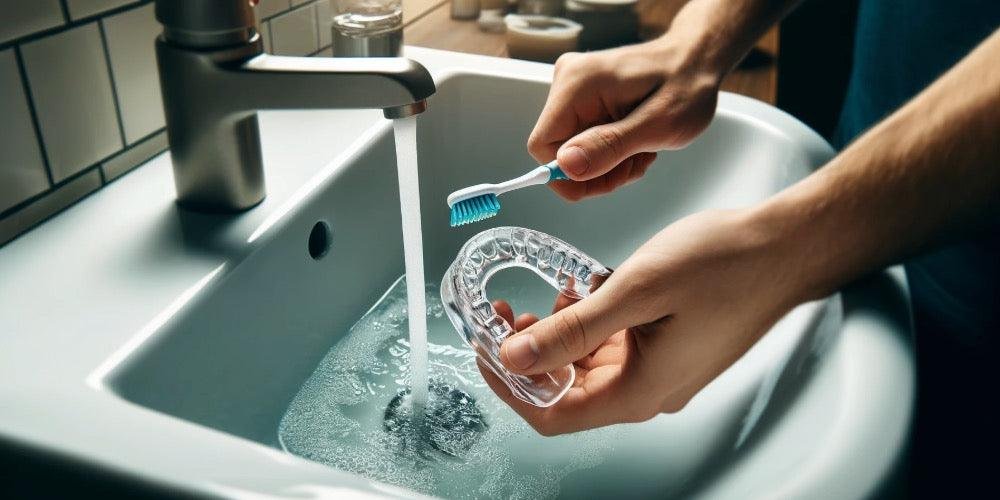Wearing a night guard is one of the smartest ways to protect your teeth against grinding (bruxism), clenching, or jaw pain. However, many people overlook a simple but vital fact: if you don’t clean it properly, your night guard can do more harm than good.
Think about it. You wear the device for 6–8 hours straight while sleeping. During that time, bacteria, saliva, and food debris build up. If ignored, your night guard can smell bad, stain yellow, and even cause mouth infections. That’s why learning how to clean night guard the right way matters more than most people realize.
This comprehensive guide covers everything: daily cleaning routines, deep-cleaning methods, what to avoid, how to store it properly, and when to replace it. By the end, you’ll have a step-by-step strategy to keep your guard spotless, fresh, and long-lasting.
Why Cleaning Your Night Guard Is Essential
A clean night guard isn’t just about aesthetics—it’s about oral health. Let’s break it down:
- Bacterial growth: Night guards trap saliva, creating the perfect environment for harmful bacteria.
- Odor problems: Without cleaning, your guard develops a foul smell that won’t go away.
- Staining: Just like your teeth, guards pick up discoloration from coffee, tea, or poor hygiene.
- Oral health issues: Gum irritation, infections, or even thrush can occur from a dirty device.
- Reduced lifespan: Neglected guards wear out faster, leading to costly replacements.
Tip: Think of your night guard as an extension of your teeth. If you wouldn’t go a day without brushing, you shouldn’t go a day without cleaning your guard.
Daily Cleaning Routine for Your Night Guard
Consistency is the key to freshness. A simple three-step routine after every use prevents buildup.
1. Rinse Immediately After Use
- Remove your night guard in the morning.
- Rinse thoroughly under lukewarm water (never hot, since heat can warp the material).
- This washes away saliva before it dries and hardens.
2. Brush Gently with a Soft Toothbrush
- Use a separate soft-bristled toothbrush—not the one you use for your teeth.
- Apply mild dish soap or clear antibacterial soap instead of toothpaste.
- Avoid abrasive pastes that can scratch the guard and trap bacteria.
3. Dry Before Storing
- Pat dry with a clean towel.
- Let it air-dry for 20–30 minutes before placing it in its case.
- Moisture breeds bacteria, so this step is critical.
Case Study Example: A 2023 survey by the American Dental Association found that 72% of patients who didn’t dry their night guards daily reported odor issues within three months. Drying alone makes a huge difference.
Weekly Deep Cleaning Methods
Even with daily care, you need a weekly deep clean to eliminate bacteria and stubborn buildup.
1. Mouthwash Soak (Alcohol-Free)
- Soak your guard in non-alcoholic mouthwash for 10–15 minutes.
- Alcohol-based rinses can damage plastic over time, so stick to gentler options.
2. Vinegar + Hydrogen Peroxide Combo
- Soak in white vinegar for 30 minutes.
- Rinse thoroughly, then soak in hydrogen peroxide for another 30 minutes.
- This removes both bacteria and odor naturally.
3. Effervescent Denture Tablets
- Drop one denture-cleaning tablet into a cup of water.
- Add your night guard and soak for 15 minutes.
- These tablets fight tough stains and odors with minimal effort.
4. Baking Soda Paste for Persistent Smells
- Mix 2 tablespoons of baking soda with water to form a paste.
- Gently brush the guard, rinse well, and dry.
- Baking soda neutralizes odors safely.
What NOT to Do When Cleaning Your Night Guard
It’s easy to make mistakes that shorten your guard’s lifespan. Avoid these:
- Don’t use hot water – causes warping.
- Don’t soak in bleach – dangerous for oral use.
- Don’t scrub with abrasive toothpaste – scratches surface.
- Don’t store it while wet – promotes mold.
- Don’t leave it in the bathroom sink – exposure to germs is higher.
How to Store Your Night Guard Safely
Storage is just as important as cleaning. Follow these tips:
- Use a ventilated storage case that allows airflow.
- Clean the case weekly with soap and water.
- Keep the case in a cool, dry place—never in a hot car or damp bathroom.
- Replace the case every 6–12 months to prevent bacterial contamination.
Signs It’s Time to Replace Your Night Guard
No matter how well you clean, night guards don’t last forever.
| Warning Sign | What It Means |
| Cracks or warping | Guard no longer protects properly |
| Persistent odor | Bacteria embedded in material |
| Deep yellow discoloration | Impossible to clean fully |
| Loose fit | Reduced protection against grinding |
On average:
- Custom-made guards last 3–5 years.
- Over-the-counter guards last 6–12 months.
Professional Cleaning Options
Your dentist can professionally clean your guard using ultrasonic cleaners, which remove deep bacteria and tartar buildup. Many dentists recommend doing this at least once or twice a year.
They can also check whether your guard still fits properly or needs replacement.
FAQs: How to Clean Night Guard
- Can I use toothpaste to clean my night guard?
No. Most toothpaste formulas are abrasive and will scratch the surface. - Is vinegar safe for daily cleaning?
Use vinegar only as part of a weekly deep-clean routine, not daily. - How often should I replace my night guard?
Custom guards last 3–5 years, while store-bought versions may need replacing yearly. - Can I boil my night guard to disinfect it?
Never. Boiling will warp or ruin the material.
Real-Life Example: What Happens If You Don’t Clean Your Night Guard
Sarah, a 32-year-old teacher, wore her over-the-counter night guard for six months without cleaning it daily. She noticed a constant bad taste in her mouth and gum irritation. Her dentist discovered yeast overgrowth caused by bacterial buildup on the guard. After switching to a proper cleaning routine, the issues resolved in just two weeks.
This case highlights the importance of consistent care. Neglecting cleaning not only shortens the life of your device but also puts your oral health at risk.
Final Tips for Keeping Your Night Guard Fresh
- Clean daily with soap and water.
- Deep clean weekly with vinegar, mouthwash, or denture tablets.
- Always dry before storing in a ventilated case.
- Replace when signs of wear, odor, or discoloration appear.
- Visit your dentist for professional cleaning and advice.
Conclusion: A Small Habit That Protects Your Smile
Learning how to clean night guard may seem like a small step, but it has big rewards. With just a few minutes of care each day, you’ll keep your device fresh, bacteria-free, and effective for years. More importantly, you’ll protect your teeth, gums, and overall oral health.
Remember: a night guard is an investment in your smile. Treat it with the same attention you give your teeth, and it will keep protecting you every night.

